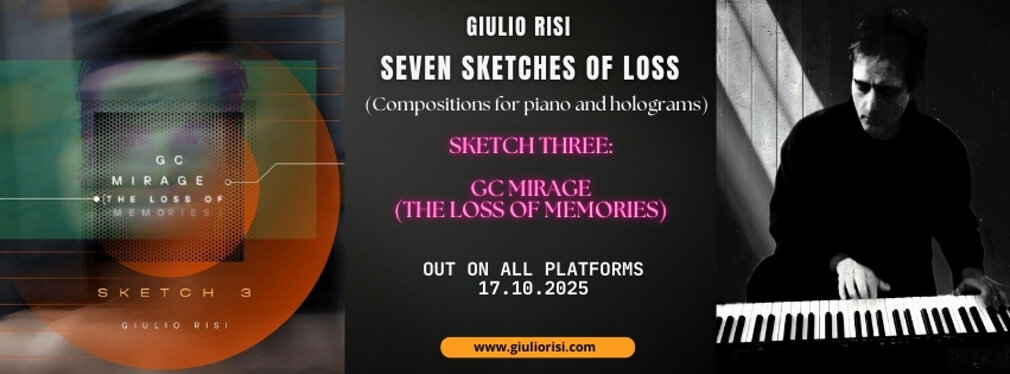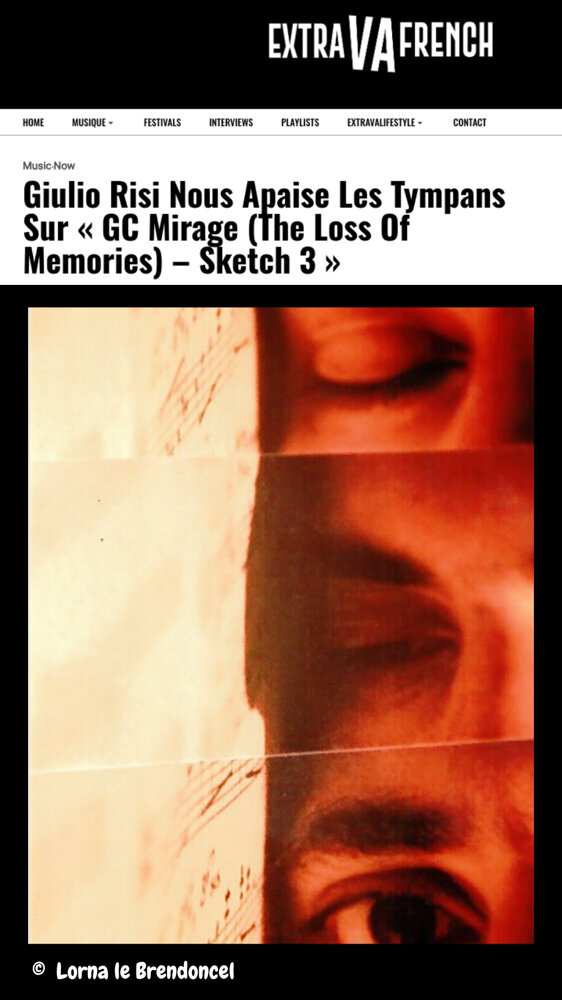




🇬🇧
Giulio Risi “GC Mirage (The Loss Of Memories) – Sketch 3 : a dialogue between the human and the sacred.
Some pieces sound like unspoken prayers, made only of sounds held at the edge of tears. GC Mirage (The Loss of Memories) by Giulio Risi is one of those, a piano piece of suspended beauty, haunted by fading memory and enduring love. Fifteen years of silence, then this return: a composer who, after walking through shadows, dares to play the light again.
The piece, the third sketch of his ambitious project Seven Sketches of Loss (Compositions for piano and holograms), opens like a whispered confidence to a departed brother. Each note seems placed with the care of a memory one fears to break. The first measures are clear, almost fragile, as if the piano hesitates to awaken a ghost. Then, slowly, the melody unfolds, deepens, rises, a dialogue between the human and the sacred.
Giulio Risi has this rare gift of making silence expressive. You can hear gospel gliding through the spaces of the classical form: harmonies ascending toward the light, basses that hold back the ache, resonances that recall an empty church after prayer. In his playing, loss becomes a substance, a soundscape explored like a ruin where every stone still whispers love.
The pianist’s virtuosity serves only emotion. No display, no pathos. Only hands capturing the keys, and a barely audible breath lurking behind the melody.
GC Mirage moves forward, like a memory reimagined, a heartbeat echoed. Within it, one hears both resignation and revolt: the impossibility of accepting oblivion, and yet the need to surrender to it in order to go on living.
What moves us most is this idea of double loss: that of the beloved, and that of the shared memory unraveling. Risi transforms this anguish into sound architecture, a fragile cathedral built on emptiness. And when the piece fades, what remains is not silence but a trace, the feeling that something, somewhere, has found peace.
With GC Mirage (The Loss of Memories), Giulio Risi signs a work of rare purity, where the piano becomes the instrument of an impossible dialogue between life and death. Rather than a piece is a passage: the journey of a man learning to say goodbye without erasing his memories.
🇮🇹
Giulio Risi “GC Mirage (The Loss Of Memories) – Sketch 3: un dialogo tra l’umano e il sacro.
Alcuni brani sembrano preghiere silenti, fatte di suoni trattenuti sul confine delle lacrime. “GC Mirage (The Loss of Memories) - Sketch 3”, di Giulio Risi è uno di questi, un pezzo per pianoforte di una bellezza sospesa, abitato dalla memoria che svanisce e dall’amore che resiste. Quindici anni di silenzio, poi questo ritorno: un compositore che, dopo aver attraversato le ombre, finalmente risuona la luce.
Il brano, terzo singolo del suo ambizioso progetto Seven Sketches of Loss (Compositions for piano and holograms) si apre come una confidenza sussurrata a un fratello perduto. Ogni nota sembra posata con la cura di un ricordo che non si vuole spezzare. Le prime misure sono limpide, quasi fragili, come se il pianoforte esitasse a risvegliare un fantasma. Poi, lentamente, la melodia si dispiega, si approfondisce, si eleva in un dialogo fra il sacro e l’umano.
Giulio Risi possiede il dono raro di rendere il silenzio espressivo. Si avverte il respiro del gospel scorrere tra le forme classiche: armonie che salgono verso la luce, bassi che trattengono il dolore, risonanze che evocano una chiesa vuota dopo la preghiera. In questo racconto la perdita diventa materia, un paesaggio sonoro esplorato come una rovina in cui ogni pietra parla ancora d’amore.
La virtuosità del pianista è qui al servizio dell’emozione. Nessuna ostentazione, nessun pathos. Solo mani che catturano i tasti, un respiro quasi impercettibile nei meandri della melodia. GC Mirage avanza come un ricordo reinventato per non lasciarlo morire. Vi si sente insieme la resa e la rivolta: l’impossibilità di accettare l’oblio, e al tempo stesso la necessità di abbandonarvisi per poter continuare a vivere.